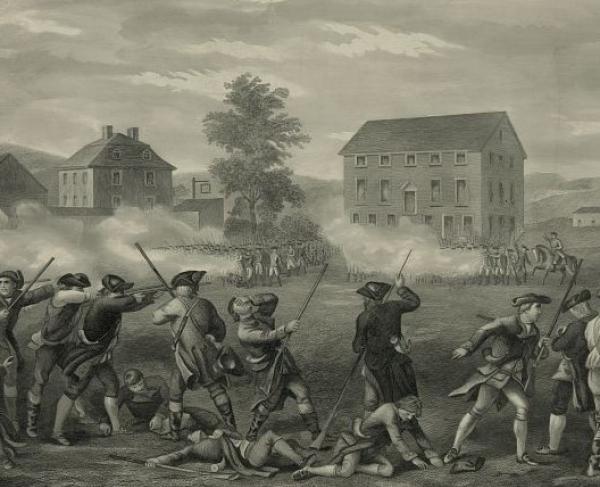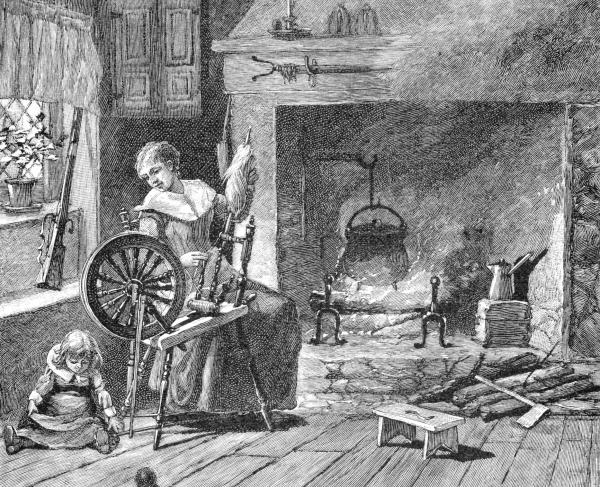Prince Estabrook

Prince Estabrook was born in 1740 or 1741, probably in Lexington, Massachusetts. Enslaved by Benjamin Estabrook who lived east of the village’s center, Prince may have done farm labor. There are few surviving records of his early life and work while enslaved.
Massachusetts law did not allow “Indians and Negroes” to train as militia, so Prince would not have marched or drilled during muster days. However, the law required all men in the community to “turn out” in case of an emergency. Under the requirement to defend the community, Prince was part of the Lexington militia.
In April 1775, rumors pointed to the likely movement of British troops from Boston toward Lexington and Concord to seize weapons. Communities and militia waited to see what would happen. During the night of April 18,1775, Paul Revere, William Dawes and other riders carried the news that British troops were moving west, and it was known that they were heading toward Concord. In Lexington—a village along the road to Concord—Captain John Parker called out the militia. Prince Estabrook joined other men of Lexington and waited.
When the British column approached the village, the militia had formed to oppose them. British officers called on the Lexington men to lay down their weapons, but they refused. Shots were fired. In the brief conflict, Prince Estabrook was wounded in the left shoulder by a musket ball. In reports written about the fight at Lexington, Prince Estabrook was listed twice—both accounts supporting that he had been wounded and that he was an enslaved man “serving in...Parker’s militia…actively engaged in fighting.”
A local doctor likely treated Prince’s injury. By June 1775, he joined the other militia members near Boston. While the Battle of Bunker Hill raged on June 17, the Lexington Company was ordered to guard the Continental Army’s headquarters at Cambridge, and Prince was numbered among the guard. Throughout the rest of the Revolutionary War, he continued to serve with Massachusetts militia and in the Continental Army. Prince Estabrook’s service record includes time with Captain Parker’s Company (1775), Colonel Jonathan Reed’s regiment (1775-1776), Colonel Eleazer Brook’s regiment (1776-1777), Continental Army (1780-1781), Colonel John Greaton’s regiment (1782) and Colonel Michael Jackson’s regiment (1783). At this time in the historical record, it is not clear if Prince enlisted in this regiments of his own accord or if he might have been serving as a substitute for a white man. He was among the thousands of Black men who served on the American side during the Revolutionary War.
Returning to Lexington when the Continental Army disbanded, Prince Estabrook was a freeman—though details of his emancipation are not known at this time. In 1783 the Massachusetts Supreme Judicial Court abolished slavery within the state, stating that holding others in bondage was against the state’s new constitution. According to the 1790 tax records, Prince lived in Benjamin Estabrook’s household as a freeman. In later years, white descendants of the Estabrook family said that Prince stayed and was employed. It is not known at this time if Prince Estabrook was ever married or had children. Later, Prince moved to Ashby, Massachusetts and stayed with Benjamin Estabrook’s son, Nathan.
Prince Estabrook died in 1830. One hundred years later the United States War Department placed a veteran’s headstone at his grave to honor Prince Estabrook’s military service during the Revolutionary. In 2008, a memorial was placed near the historic Lexington Green, honoring Prince Estabrook and other men of color who fought in the American militias or Continental Army during the Revolutionary War.
From slavery to freedom—from the Revolutionary War’s beginning to end—Prince Estabrook stood, fought, served and survived. While details of his life are unknown or unfortunately hazy in the historical records, he is remembered among the courageous men who fought at Lexington and beyond with the hopes for national and personal freedom.
Related Battles
93
300

